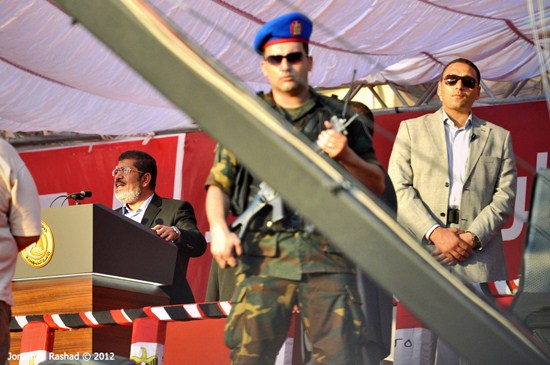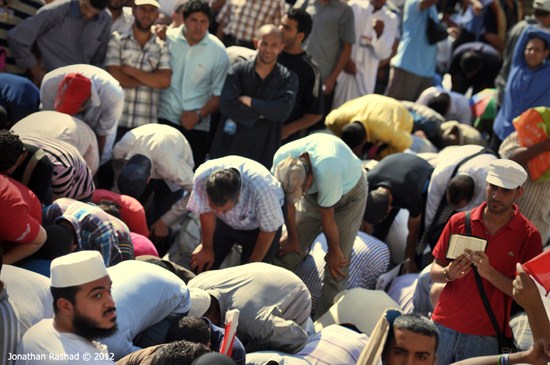Morsi’s Coup in Egypt: Is the Middle-East Headed for a Muslim Brotherhood Takeover?

NEWS JUNKIE POST
Nov 23, 2012 at 12:27 pmWas Morsi’s coup a payoff from Washington for brokering the ceasefire between Hamas and Israel?
Today, Egypt went back to square one, as if the Egyptian Revolution never happened. Egyptians now have a new Mubarak in the person of President Morsi. Morsi has assumed extended power over all the branches of government, including the judiciary. It is unlikely that Morsi’s action today was not cleared by both the Obama and Netanyahu administrations. During the past two weeks, the relationship between Morsi and the White House had grown a lot closer.
The White House phone log tells the story of how critical the relationship between President Obama and his Egyptian counterpart became during the Gaza crisis. If the cease fire between Hamas and Israel is a very temporary situation, with both sides claiming that they have made gains, the real winner of this conflict that killed more than 150 Palestinians and five Israelis is Morsi. Some US-MiddleEast analysts are skeptical about what appreas to be a diplomatic “honeymoon” between Obama and Morsi. “I would caution the president from believing that president Morsi has in any way distanced himself from his ideological roots”, said Robert Satloff, Executive Director of the Washington Institute for Near-East Policy. What is a certain outcome in all this — unless the Egyptian people revolt again — is that the Egyptian Revolution accomplished almost nothing.
Will the Muslim Brotherhood end up ruling a post-Assad Syria?
The Muslim Brotherhood was founded in Egypt in 1928 as an Islamist political and social movement to promote the implementation of Sharia law and Islamic ethical behavior into civic duties. The Muslim Brotherhood, very much like other religious organizations, is financed by contributions from members who are required to allocate at least 10 percent of their income to the organization. Some very large contributions go to Egypt, which has helped to secure Morsi’s election, Saudi Arabia and the Gulf region. The Muslim Brotherhood has branches all over the Middle East and also in Africa. For example, countries with chapters of this Sunni organization include Bahrain, Jordan, Tunisia, Libya, Algeria, Somalia, Sudan, Yemen, Iraq and Syria.
In Syria, the Muslim Brotherhood was founded in 1945, a year before the country’s independence from France. After Assad’s father and his Baath party took power in 1963, the Muslim Brotherhood was banned. But the Islamist Muslim Brotherhood kept opposing the secularist Baath party of the Assad (both father and son). The Muslim Brotherhood is now the dominant group in the Syrian “revolution”. The Sunni insurrection against the Assad regime in the current Syrian civil war is supported by both the West and Saudi Arabia. Local Muslim Brotherhood members are the dominant elements of the insurrection; others such as the Salafi Jihadists are sent for and paid by Saudi Arabia.
What Arab Revolution?
With Morsi’s Muslim Brotherhood fully in power, and presumably also in control of the army, in the most populous country in the region, and considering that it is an organization established all over the region, it seems unlikely that the Muslim Brotherhood’s rise to power will cease. It is now, de facto, promoted by the West, with France, Italy and the UK enthusiastically jumping in to help the Syrian “revolutionaries.” The Arab Revolution of Spring 2011, which was a secular movement at its inception, has been hijacked by Islamic parties. Strangely, in this theocratic Middle East shaping up on the horizon, members of the Muslim Brotherhood are now viewed as “pragmatic and moderate.” One supposes that this can be the case if they are compared to the hard-core fundamentalists foot soldiers of Saudi Arabia, who are the Salafis.
Editor’s Note: All photographs by Jonathan Rashad.
Related Articles
- November 20, 2012 G. Mercier on RT: Israel Attack on Gaza Is Worse Than a Crime, It’s a Blunder
- May 28, 2013 Qatar, Saudi Arabia, Israel and the West’s Unholy Alliance to Wreck and Exploit
- November 18, 2012 Will the Slaughter in Gaza Trigger a Real Arab Revolution?
- November 16, 2012 Israel’s Attack on Gaza Could Be the Opening Salvo of World War III
- December 23, 2011 Are Islamist Fundamentalists Hijacking The Arab Revolution?
- December 8, 2012 NATO’s Pending Move on Syria: Geopolitics of Chaos















2 Responses to Morsi’s Coup in Egypt: Is the Middle-East Headed for a Muslim Brotherhood Takeover?
You must be logged in to post a comment Login